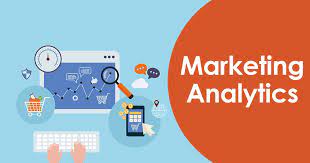The Power of Marketing Analytics
Marketing analytics is the practice of measuring, managing, and analysing marketing performance to maximise its effectiveness and optimise return on investment (ROI). In today’s digital age, where data is abundant and consumer behaviour is constantly evolving, harnessing the power of marketing analytics has become essential for businesses to stay competitive.
Understanding Consumer Behaviour
One of the key benefits of marketing analytics is its ability to provide insights into consumer behaviour. By analysing data from various sources such as website traffic, social media engagement, and email campaigns, marketers can gain a deeper understanding of their target audience. This knowledge allows businesses to tailor their marketing strategies to better resonate with consumers and drive engagement.
Measuring Campaign Performance
Marketing analytics enables businesses to track the performance of their marketing campaigns in real-time. By monitoring key metrics such as click-through rates, conversion rates, and customer acquisition costs, marketers can quickly identify what’s working and what’s not. This data-driven approach empowers businesses to make informed decisions and allocate resources more effectively.
Optimising ROI
Ultimately, the goal of marketing analytics is to maximise return on investment. By continuously analysing data and refining strategies based on insights gained from analytics tools, businesses can improve the efficiency and effectiveness of their marketing efforts. This iterative process of testing, measuring, and refining allows businesses to achieve better results with less resources.
The Future of Marketing Analytics
As technology continues to advance and data becomes even more abundant, the role of marketing analytics will only grow in importance. Businesses that embrace a data-driven approach to marketing will be better positioned to adapt to changing market conditions, anticipate consumer trends, and stay ahead of the competition.
8 Essential Tips for Mastering Marketing Analytics: Strategies for Data-Driven Success
- Set clear goals and objectives for your marketing analytics efforts.
- Use a variety of tools and software to collect and analyse data effectively.
- Regularly track key performance indicators (KPIs) to measure the success of your marketing campaigns.
- Segment your audience to better understand their behaviour and preferences.
- Utilise A/B testing to experiment with different strategies and improve campaign performance.
- Invest in training for your team to ensure they have the necessary skills to interpret analytics data accurately.
- Stay updated on industry trends and advancements in marketing analytics techniques.
- Use data visualisation techniques to present findings in a clear and compelling manner.
Set clear goals and objectives for your marketing analytics efforts.
Setting clear goals and objectives for your marketing analytics efforts is crucial for driving meaningful insights and achieving measurable results. By defining specific targets such as increasing website traffic, improving conversion rates, or enhancing customer engagement, businesses can focus their analytics efforts on key performance indicators that align with their overall marketing strategy. Clear goals not only provide a roadmap for data analysis but also enable businesses to track progress, make informed decisions, and ultimately drive success in their marketing campaigns.
Use a variety of tools and software to collect and analyse data effectively.
To maximise the potential of marketing analytics, it is crucial to utilise a diverse range of tools and software for collecting and analysing data effectively. By leveraging different tools tailored to specific aspects of data collection and analysis, businesses can gain comprehensive insights into consumer behaviour, campaign performance, and ROI. This multifaceted approach not only enhances the accuracy and depth of the data gathered but also enables marketers to make informed decisions and drive strategic improvements in their marketing strategies.
Regularly track key performance indicators (KPIs) to measure the success of your marketing campaigns.
Regularly tracking key performance indicators (KPIs) is crucial for evaluating the effectiveness of your marketing campaigns. By monitoring metrics such as conversion rates, website traffic, and customer acquisition costs, businesses can gain valuable insights into the impact of their marketing efforts. This data-driven approach not only allows for timely adjustments to campaigns but also enables businesses to make informed decisions on resource allocation and strategy refinement, ultimately leading to improved campaign performance and better return on investment.
Segment your audience to better understand their behaviour and preferences.
Segmenting your audience is a crucial strategy in marketing analytics to gain deeper insights into their behaviour and preferences. By dividing your audience into distinct groups based on demographics, psychographics, or behaviour patterns, you can tailor your marketing efforts more effectively. Understanding the unique needs and interests of each segment allows you to create targeted campaigns that resonate with specific audiences, ultimately leading to higher engagement and conversion rates.
Utilise A/B testing to experiment with different strategies and improve campaign performance.
Utilising A/B testing in marketing analytics is a powerful strategy to experiment with different approaches and enhance campaign performance. By comparing the effectiveness of two variations (A and B) of a marketing element, such as an email subject line or a website layout, businesses can gather valuable insights into what resonates best with their audience. This data-driven approach allows marketers to make informed decisions based on real-time results, leading to more effective campaigns and ultimately, improved ROI.
Invest in training for your team to ensure they have the necessary skills to interpret analytics data accurately.
Investing in training for your team is crucial to ensure they possess the essential skills to accurately interpret analytics data. By providing your team with the necessary knowledge and expertise, you empower them to extract meaningful insights from the data, make informed decisions, and drive effective marketing strategies. Training not only enhances individual capabilities but also fosters a culture of data-driven decision-making within your organisation, ultimately leading to improved performance and better results in the competitive landscape of marketing analytics.
Stay updated on industry trends and advancements in marketing analytics techniques.
To stay ahead in the realm of marketing analytics, it is crucial to stay updated on industry trends and advancements in marketing analytics techniques. By keeping abreast of the latest developments, businesses can leverage cutting-edge tools and strategies to enhance their data analysis capabilities and drive more impactful marketing campaigns. Continuous learning and adaptation to new techniques ensure that businesses remain competitive and maximise the potential of their marketing efforts in an ever-evolving digital landscape.
Use data visualisation techniques to present findings in a clear and compelling manner.
Utilising data visualisation techniques is a powerful tip in the realm of marketing analytics. By transforming complex data sets into visually engaging charts, graphs, and infographics, businesses can effectively present their findings in a clear and compelling manner. Visual representations not only make it easier for stakeholders to grasp key insights at a glance but also enhance the overall impact of the data. This approach not only aids in better decision-making but also helps in communicating results more effectively across teams and departments.




